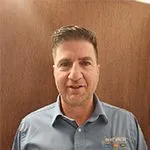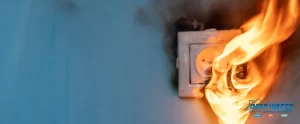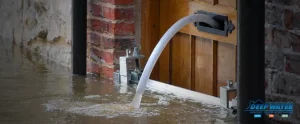When firefighters extinguish the fire in your property, know that it isn’t safe to go back just yet.
Awareness of the health risks caused by house fire smoke prevents further exposure that can affect more than just your respiratory tract. You might think that you can deal with the damage and save yourself money. However, it’s a job best handled by professionals.
Smoke and soot are more than just reminders of the disaster that struck your home. Exposure to them will put you, your loved ones, and even your pets in danger. Deep Water is here to enlighten you about why breathing soot and health risks come hand in hand.
Smoke and Soot: What Are They?
Smoke is a mixture of particles and gases from different items that burned during the fire. It may include plastics, foam, wood products, synthetic fabrics, carpets, and asbestos-containing materials. Smoke occurs due to incomplete combustion.
Then, it leaves tiny particles of carbon in the air, known as soot.
The approximate size of soot is 2.5 microns. Soot is invisible to the naked eye, and anyone can inhale it quickly. They also cling to walls or any areas that are cooler than the source of the fire. Both smoke and soot exist when there’s a fire. It’s not just unpleasant to look at; it also has an awful smell. Aside from that, there are breathing soot health risks to watch out for.
As mentioned, the mixture of chemicals that burn during the fire is hazardous to your health. Smoke and soot can damage your property and belongings, making fire damage mitigation efforts difficult and dangerous.
What Are the Health Risks Caused by House Fire Smoke?
A fire in your home is heartbreaking and traumatic. Although your priority might be to restore your property’s former glory, you should know the health hazards that come with smoke and soot. Here are the health risks you should know about:
1. Chronic Obstructive Pulmonary Disease
When there are smoke and soot particles in the air, your air passages put in more effort so you can breathe. When that happens, they inflame, which may result in long-term breathing problems.
Individuals who have prolonged exposure to soot and smoke may develop chronic obstructive pulmonary disease (COPD), putting them at risk for cancer and heart disease.
2. Eye and Skin Irritation
A less severe health hazard from smoke and soot exposure is eye and skin irritation. Because of the chemicals present, individuals exposed to it may experience itchiness and discomfort.
You can also expose yourself to it through your clothes. So you may still experience the irritation even if you’re not on the property.
3. Asthma
People who have asthma are at a greater risk of attacks when they inhale smoke and soot. Due to poor air quality, breathing comfortably may be a struggle – until professionals clean and restore the property.
Throat and lung irritation are also common, linked to asthma in kids, making them more vulnerable to infections.
The last thing you need to deal with is health issues after a house fire. Anyone is at risk, but infants, children, and the elderly are more susceptible to the harmful effects of smoke and soot. It is of utmost importance that you take all necessary steps to ensure that your property is safe and clean.
How Can You Be Exposed to Smoke and Soot?
Exposure to soot and smoke in the aftermath of a house fire, i.e., inhalation, ingestion, and eyes and skin irritation, poses significant dangers. Contacting the particles puts you at risk for severe health issues, particularly once they enter your bloodstream.
Apart from the previously mentioned health hazards, here are some other health problems one might experience when exposed to smoke and soot:
- Shortness of breath
- Respiratory issues
- Stroke
- Bronchitis
- Premature death
What Are the Toxic Materials Found in Smoke and Soot?
- Chemicals like hydrogen, ammonia, nitrogen oxide, tar, and carbon monoxide are from carbon materials.
- Phosgene, dioxin, halocarbons, bromomethane, hydrogen chloride, and chloromethane are from PVC plastic.
- Sulfur can form thiols, hydrogen sulfide, and sulfur dioxide, causing residual unpleasant odors.
- Building materials from the 1950s-1980s have cancer-causing asbestos fibers.
- The partial oxidation of hydrocarbons may release phenols, carboxylic acids, cresols, furfural, ketones, formaldehyde, and acrolein.
- Wood smoke also has over a hundred chemicals you can find in cigarette smoke.
Why Leave the Cleaning and Mitigation to Experts?
Even though soot and smoke are not visible to you, you can still prevent the health hazards that come with it with professional help. Fire damage mitigation experts have the proper safety equipment, tools, and skills to handle the aftermath of a fire.
They also know the best ventilation practices to preserve the air quality in your property. Calling them also gives you the best chance of restoring your home and belongings to their former state.
Deep Water Is Here for You
If you’re looking for experts who can handle the smoke and soot, Deep Water is the one to call.
Aside from fire damage mitigation services, we also provide mold mitigation, sewage clean-up, COVID-19 decontamination, and water damage mitigation services in the Omaha, NE, area. Call us today! Our experts are ready to do the job any time, any day.






